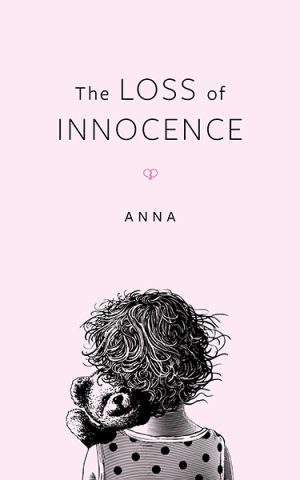
The Loss of Innocence
Anna’s intimate poetry collection The Loss of Innocence is full of personal turmoil, reflection, and salvation.
The semi-anonymity of the book’s authorship is critical to understanding its blunt and honest poems. They express feelings of anxiety, hopelessness, isolation, and depression, charting frustrating attempts to pierce the dark shroud that encloses their narrator. The entries probe childhood experiences and the lingering effects of abuse, their focus sharp. Some poems suggest other topics, such as mental illness, but the underlying theme is a unified one, of overcoming obstacles.
Their use of poetic language and techniques limited, some poems include metaphors like “a sea of tears” or a person in “a place of darkness”—not fresh, but effective. The entries are punctuated by the image of a child from behind, their teddy bear peeking over their shoulder—a striking but repetitive sketch.
Their style direct, most of the poems follow a four-line, ABCB rhyme scheme. Some poems are as short as two stanzas; others are as long as thirteen. Syllable counts within stanzas sometimes vary, interrupting rhythms. The beginnings of every line are capitalized, and the resultant impression is rigid. Still, the entries are engaging, often because of their lack of artifice. They represent an unrelenting series of revelations made in clear language, as in “Sadness”:
Why is it that sadness
Always surrounds me?
I’m tired of taking pills
To make me happy.
Their topics all closely related, the poems are presented in a kind of chronological order, with titles like “Innocent Children,” “An Empty Shell,” and “Helpless” describing the effects of childhood trauma.
There’s a nice transition between “Darkness and Despair” and the following “A Little Light” in which the tone becomes hopeful, reflecting on the reconciliation of a girl injured in the past with a mature, adult woman who is ready to move on. It is elsewhere shown that the speaker’s efforts do not come easy:
At times I feel so healthy
Like I can make it through the day.
Then in a fleeting moment
It all just goes away.
By the final entry, “Twenty-Four Years,” it’s clear that the addressed challenges have taken time to confront. Personal, emotional, and unconcerned with impressing their audience, the poems are forwarded as still raw:
So in a book I put them
For all the world to see.
You have no idea
How hard this is for me.
That struggle is palpable; each word hits home, first seeming to convey a mere sliver of emotion, but suggesting the presence of much more underneath.
Thriving on direct, plain-language communication, The Loss of Innocence is a slim but spirited collection whose entries are focused on self-discovery.
Reviewed by
Peter Dabbene
Disclosure: This article is not an endorsement, but a review. The publisher of this book provided free copies of the book and paid a small fee to have their book reviewed by a professional reviewer. Foreword Reviews and Clarion Reviews make no guarantee that the publisher will receive a positive review. Foreword Magazine, Inc. is disclosing this in accordance with the Federal Trade Commission’s 16 CFR, Part 255.
